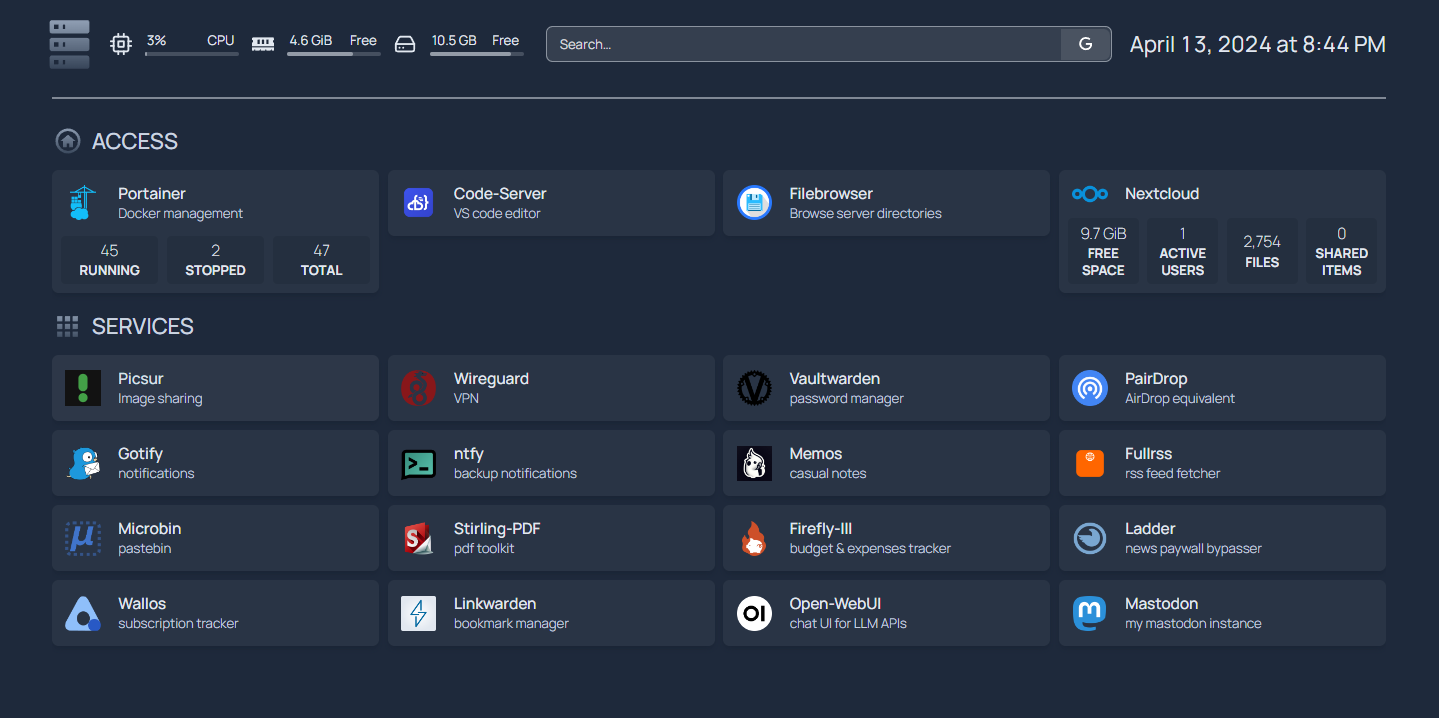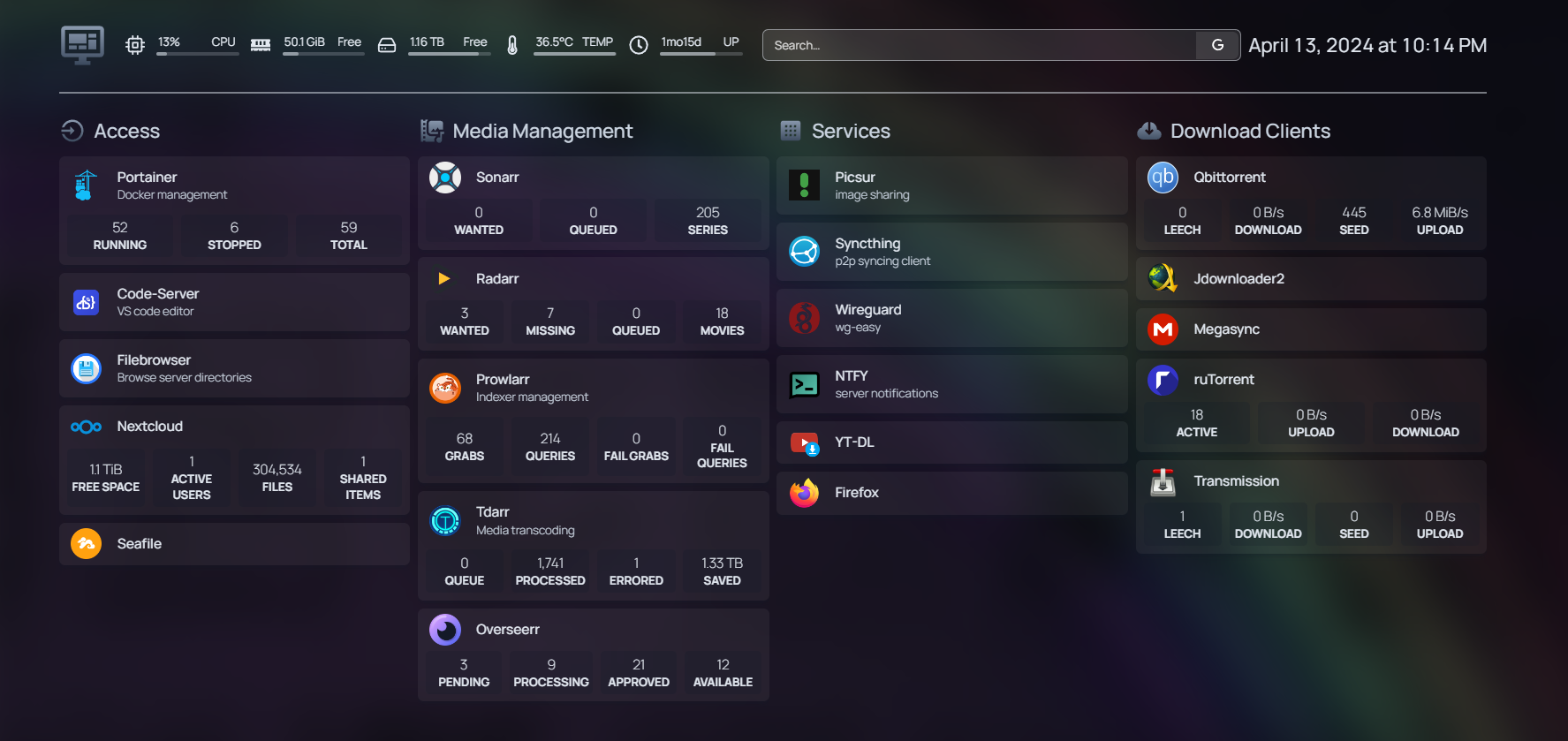My setup
It’s about time I write about selfhosted services that are most useful to me. So, My setup consists of two systems.
- VPS hosted at CloudHatch
- Dedicated Server hosted at Hetzner
I use my VPS to selfhost things that are most important to me. Such as my passowrd manager, note-taking app, bookmark manager and etc.
I use my Hetzner server mostly to run the *arr suite (Sonarr, Radarr, Prowlarr etc.) and anything that can be storage extensive to run on my VPS.
Debian 12 is my OS of choice for both the VPS and the dedi.
Specs:
CPU RAM STORAGE VPS AMD EPYC 7443 4 vCores @ 2.844GHz 16 GB 75 GB NVME SSD Dedi Intel Xeon E3-1275v6 8 Cores @ 4.200GHz 64 GB 8 TB HDD
Top services in my VPS
Here, I will mention my personal favourite/most used services in my VPS.
Please refer to the image below to get a overview of all the apps I am currently hosting in my VPS as I won’t go through all of them.
-
Homepage - Homepage is a highly customizable application dashboard with integrations for over 100 services (Portainer, *arr suite, Nextcloud etc.). The above screenshot is from Homepage. I always come to Homepage whenever I want to access an application or just want to get a glance of what’s happening in my VPS such as cpu and ram usage.
-
Memos - Memos is a simple, lightweight note-taking app with a beautiful UI. Memos is what replaced Google Keep for me. Whenever I want to note down a quick thought or my shopping list, this is what I use. The only thing I am missing from Keep is reminders. I hope the devs of Memos will eventually add it to Memos. I highly recommend the third-party app for Memos called Moe Memos. I use Moe Memos android app to note down things while on the go.
-
Firefly III - Firefly III is a personal finance manager to help you track your expenses and income. This is a must have for me. It helps me track my expenses and get a sense of my spending habits, which eventually helped me to save more and limit my expenses. I use a third-party app called Abacus to access my Firefly instance from my Android device. It pretty much has all the functions of Firefly and I use it to quickly add and modify records while on the go. It’s such a beautiful app and I highly recommend it for your mobile device.
-
Vaultwarden - Vaultwarden is a passowrd manager that is compatible with Bitwarden. It is basically an alternative implementation of the Bitwarden server API written in Rust, and it is very lightweight compared to the Bitwarden’s selfhosted implementation. Good thing of this is you can use official Bitwarden clients to access your Vaultwarden instance. I highly recommend setting up a solid backup plan in advance if you ever decide to use this as your primary passowrd manager.
-
code-server - code-server is basically VS Code running on a remote server. It helps me access/edit my docker config files and scripts from the browser, which is pretty convinient. This is one of the most used apps in my list.
-
Ntfy - Ntfy is simple yet effective notification service. I use it to get alerts to my phone regarding SSH logins and backup notifications. You can customize the prority of notifications based on the event. For example, I configure it to priority alert whenver one of my backup scripts get failed, whenever a succefull SSH login attempt has been made to my VPS or when my VPS is running out of storage.
Honorable mentions:
Stirling-PDF to edit/manipulate PDFs via web browser.
Linkwarden to save and manage my bookmarks.
Top services in my Dedi
Usecase
As mentioned earlier, I mainly use my dedi to run the *arr suite which can automate the whole media acquiring thing ;)
If you notice, I don’t have a media server (Plex, Jellfin etc.) running on either of my servers. I initially planned on running Plex on my dedi, but decided against it because of the latency and peering issues I faced in the past. Instead, I run Plex and Jellyfin on a seedbox that is close to my location and sync media files to the seedbox from my dedi. I also transcode all my media to reduce the size before sending to seedbox because bandwidth is expensive on where I live and therefore saving my users’ monthly bandwidth 😄
Now you might ask, why don’t you just use the transcoding capability built-in to the media server? good question. There are several reasons.
-
Quality: it is often not great when transcoding on the fly compared to transcoding beforehand with a slow preset via HandBrakeCLI. I use Tdarr to automate the whole thing. More on that later.
-
Downloading: One of my users like to download the media files via Jellyfin and watch them offline. Jellyfin doesn’t have a function to transcode files while downloading. It can only download the original file. Plex has that functionality, but it doesn’t work half of the time 😅
Here is my personal favourite/most used services in my Dedi.
Please refer to the image above to get a overview of all the apps I am currently hosting in my dedi as I won’t go through all of them. Also, please not that I won’t be mentioning the services that are already mentioned in the VPS section.
-
Sonarr - Sonarr is a PVR to automatically monitor, download and rename TV shows from torrent sites and usenet.
-
Radarr - Radarr is the same as Sonarr, but for movies.
-
Prowlarr - Prowlarr is an indexer manager for Torrent Trackers and Usenet Indexers. It integrates seamlessly with Sonarr, Radarr and myriad of *arr apps.
-
Tdarr - Tdarr is a conditional based transcoding application for automating media library transcode/remux management in order to process your media files as required. This is what I use to automate my media transcoding needs. It has its own plugins ecosystem to do various tasks like remove subtitles, remove non-English audio tracks, HEVC transcoding etc. Tdarr use FFmpeg and Handbrake in the backend. I use my own custom HandBrake presets with a customized plugin to reduce size and change the resolution to my needs.
-
Qbittorrent - Qbittorent is my primary download client that I use to download torrents from trackers. As I mentioned, everything is automated through Sonarr, Radarr and Prowlarr so I don’t need to manually add torrents or anything. I also use Transmission, specifically this one which has built-in VPN support. I use this to download torrents from public trackers.
-
Nextcloud - Nextcloud is a selfhosted cloud solution that can replace the Google ecosystem. It has the functionality to backup your files, edit docuemnts, collaborate with users and various other functions ranging from note taking to email and RSS feed management. I personally use this to backup certain folders from my mobile devices and laptop. They have clients for all the major platforms and workds flawlessly for my usecase.
-
Syncthing - Syncthing is a continuous file synchronization program which uses P2P method to sync files between two or more computers. I use Syncthing to sync media files that get transcoded via Tdarr to my Seedbox so that I can watch them on Plex/Jellyfin. This is one of the set-once-and-forget-it kind of applications I use and I am glad something like this exists.
Honorable mentions:
Overseerr to manage TV show/movie requests. I use this in conjunction with Requestrr which integrates with Overseer to request media via Discord. I am new to this setup, but loving it so far in terms of its usability and ease of use.
Final thoughts
These are my top apps that I use in my selfhosted systems. As mentioned I did not go through all the apps I use, but you can get an idea of what I am using by referring to the screenshots. I don’t think my list for top apps would change in the future, but if it does I will definitely be doing an update post 😊
Thank you for reading. Cheers!


